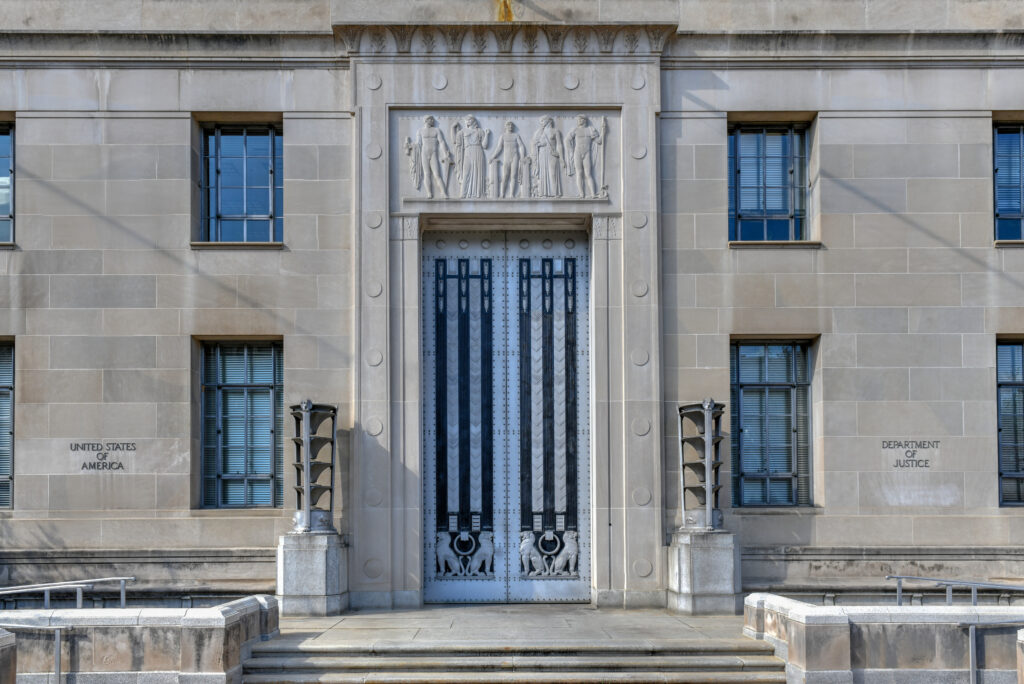US Department of Justice Intervenes in Georgia Redistricting Cases
WASHINGTON, D.C. — On Friday, the United States Department of Justice (DOJ) intervened in three redistricting cases in Georgia challenging the state’s legislative and congressional maps under Section 2 of the Voting Rights Act (VRA).

Why did the DOJ get involved?
The DOJ’s involvement in this case comes after the defendants — Georgia Secretary of State Brad Raffensperger (R) and state election board officials — notified the court in October that they are challenging the constitutionality of Section 2 of the VRA, which prohibits any voting law, practice or map that results in the “denial or abridgement of the right of any citizen of the United States to vote on account of race or color.”
When a party challenges the constitutionality of a federal law — in this case Section 2 the VRA — they must submit a notice to the court stating that they are challenging the constitutionality of the law. At that point, the DOJ may choose to get involved. In this case, the court gave the U.S. attorney general 60 days from Oct. 4 to notify the court of its position.
The DOJ’s intervention refutes these arguments. In its filing, the DOJ argues that Section 2 is constitutional and Raffensperger’s “arguments are neither novel nor correct.”
In the time between the court’s request for the DOJ’s response and now, the court struck down Georgia’s legislative and congressional maps after finding that the maps violate the VRA and ordered new maps to be enacted by Dec. 8.
The ruling addressed Republicans’ fringe arguments about Section 2, and rejected the state’s argument that a private right of action does not exist under Section 2 of the VRA since “the Court has already determined that a private right of action under Section 2 exists.”
In addition, the court rejected the state’s argument that Section 2 is not constitutional, holding that “the Supreme recently rejected the same argument urged by the State of Alabama in Allen v. Milligan…Accordingly, the Court concludes that there is no merit to the affirmative defenses challenging the constitutionality of Section 2.”
Republicans continue to threaten the VRA.
Even after the reaffirmation of Section 2 in Allen v. Milligan at the beginning of the summer, Republicans are still threatening the important provisions’ constitutionality. Thus, the DOJ — as it did in Allen — has stepped in to defend this critical VRA provision.
In redistricting cases across the South, Republicans are making radical legal arguments in the wake of both Allen and Students For Fair Admissions v. Harvard (which ended affirmative action in higher education) to avoid drawing new, fair maps. In Alabama, Republican legislators engaged in an unprecedented defiance that ultimately ended with another Supreme Court decision affirming the need for a congressional map with two Black-opportunity districts.
In Louisiana, Republicans are using the court’s ruling in the affirmative action case to argue that Section 2 — which Republican officials contend similarly requires classifying voters based on their race — may also no longer apply to Louisiana. Now in Georgia, the Republican defendants are taking another page out of this playbook to argue that Section 2 “may very well be unconstitutional” and not enforceable by plaintiffs other than the DOJ.
Georgia was ordered to implement new maps by Dec. 8.
The DOJ’s intervention does not “disturb” the court’s ruling striking down all three maps late last month. Although the intervention happened after the court’s decision in the case, it is still important as Raffensperger has stated he will appeal the ruling.
As a result of the district court’s decision, Georgia will be required to draw a new congressional map that includes an additional majority-Black district and state legislative maps containing seven additional majority-Black districts by Dec. 8. Gov. Brian Kemp (R) has scheduled a special legislative session for Nov. 29 to begin the process of drawing new maps.
Read the DOJ’s notice of intervention here.
Learn more about the cases here.
Learn more about the DOJ’s involvement in voting and redistricting lawsuits here.